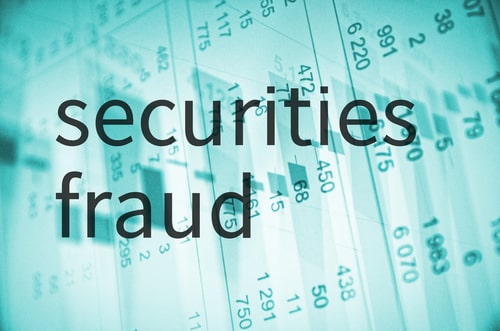Rumored Buzz on Securities Fraud Class Actions
Securities Fraud Class Actions Can Be Fun For Anyone
Table of ContentsThe Ultimate Guide To Securities Fraud Class ActionsRumored Buzz on Securities Fraud Class ActionsAll About Securities Fraud Class ActionsThe Securities Fraud Class Actions DiariesAn Unbiased View of Securities Fraud Class ActionsSecurities Fraud Class Actions - The Facts
Lots of safety and securities class activities will contend least one acquired fit as a "tag-along" suit. In 1998, Congress passed the Stocks Litigation Attire Criteria Act (SLUSA) in an effort to close a loophole in the Personal Securities Lawsuits and Regulatory Enforcement Reform Act of 1995 (PSLRA) that allowed complainants' lawyers to submit national protections class activities in state courts.
Our litigators are experienced in assaulting "demand futility" accusations made versus a board. We have actually been effective in getting keeps of the match or exploration, know when to and when not to establish a special litigation committee, and how to avoid having the tail wag the dog with respect to derivative suits and safety and securities class actions.
Little Known Facts About Securities Fraud Class Actions.
An individual capitalist that count on the CEO's first declaration to purchase supply might file a claim against the firm before Basic; what Standard enabled is for suits consisting of class actions to continue even if the suing financiers did not understand about or straight depend upon the statement. The Court appears to have assumed assisting in class activities in this way would certainly advance the twin objectives of anti-securities-fraud legislations: target payment and fraud prevention.
A key demand of the assumption is that an alleged fallacy has to have actually had some impact on the cost of the security traded by the plaintiffs; otherwise, the complainant can not be claimed to have depended on the fraud, also indirectly.
Between 2002 and 2004, nearly fifty percent of all pending course activities in government courts were protections related. Since 2012, securities-fraud suits have progressively enhanced each year; most just recently, there was a 7.
The Only Guide for Securities Fraud Class Actions
The PSLRA increased pleading standards and consisted of a number of other reforms; notably, the initial draft of the Act would certainly have eliminated the Basic assumption entirely. Nevertheless, while the PSLRA did reduce unimportant claims somewhat, the proceeding rise in securities-fraud class activities suggests that excessive lawsuits remains a significant issue.
At a minimum, then, there seems support in the courts, the academy, and the legislature for both (1) lowering meritless securities-fraud filings and (2) ensuring that such instances, once submitted, do not survive the motion-to-dismiss or class-certification phases of lawsuits. A chance to attain one or both of these goals via judicial intervention developed in Halliburton II.
Halliburton II: The Supreme Court's Action to the Rise Halliburton II marked the 2nd time that the long-running class action versus Halliburton Co. for alleged safeties fraud then in its thirteenth year had actually been before the Supreme Court. In 2011, the events had actually clashed over whether plaintiffs need to prove loss causation before or after course certification.
The Ultimate Guide To Securities Fraud Class Actions

He believed a contrary judgment would certainly be odd since the identical proof that accuseds would present to reveal that there was no price you can try these out impact was currently acceptable before course accreditation in order to counter a component of the Fundamental presumption. If the proof stopped working to counter that navigate to this site component of the anticipation but did confirm that there had actually been no price influence, a district court would need to blind itself to this fact and license the class under the fraud-on-the-market theory, also though the theory was simply not appropriate.
In answering both questions offered, Chief Justice Roberts was careful to prevent stepping right into the spirited plan debate over 10b-5 course actions. Halliburton did try to raise policy concerns as an example, that securities-fraud course actions might "allow complainants to extort big settlements. for meritless insurance claims." The Chief Justice claimed that these kinds of worries were "extra appropriately resolved to Congress," pointing out that Congress had verified itself eager to respond to "viewed abuses" of 10b-5 course activities by passing the PSLRA - Securities Fraud Class Actions.
The smart Trick of Securities Fraud Class Actions That Nobody is Talking About
He would certainly have voided the Fundamental anticipation, which in his view has resulted in "an unrecognizably wide reason for activity prepared made for course qualification" that is irregular with both the economic literature and the Court's succeeding class-certification caselaw. Questioning that an opportunity for pre-certification counterclaim would complete a lot, Justice Thomas contended that as a practical issue answer had thus much verified almost impossible and would certainly continue to be so also if allowed prior to course accreditation.
Analysts and sound judgment alike recommended that by paying for defendants a possibility to defeat meritless claims prior to a class was licensed (and before the stress to clear up became overwhelming), Halliburton II would certainly enable those meritless claims to really be defeated at a purposeful rate. Yet this Part says that Halliburton II's guarantee was an impression and might have been recognized therefore on the day that the choice was issued, for one basic reason: the price-maintenance concept.
Theoretically, the rate effect to be rebutted can turn up in 2 ways. The initial so-called "front-end" rate effect is obvious: a misstatement can cause a change in market assumptions regarding a safety and security and cause an instant swing in its rate. For instance, think the market anticipates a company to make profits of $100, the business in fact does earn $100, yet the CEO lies and reports earnings of $125.
Rumored Buzz on Securities Fraud Class Actions
Because the market's assumptions were satisfied, the rate of the firm's supply need to remain stable at the pre-misrepresentation baseline. The price-maintenance theory holds that there is rate influence, due to the fact that the misstatement protected against the market rate from falling as it would have if the CEO had told the fact. Here, also, rising cost of living will certainly dissipate when a restorative disclosure leads the marketplace to include the truth right into the marketplace cost.
Instead, site defendants must reveal that none of the cost motion on the date of an alleged rehabilitative disclosure was connected to the disclosure. This is an uphill struggle. There will almost constantly be some cost movement on that particular day, since plaintiffs typically submit 10b-5 fits in the wake of a substantial cost change affirming it was the result of a corrective disclosure.
Consequently, accuseds usually can not well show that none of the drop was associated with the corrective disclosure, and the price-maintenance concept if valid has actually made it alongside difficult for accuseds to rebut the presumption, also in meritless cases - Securities Fraud Class Actions. B. Complainants' Invocation and Courts' Approval of the Price-Maintenance Theory There is little inquiry that the theory stands